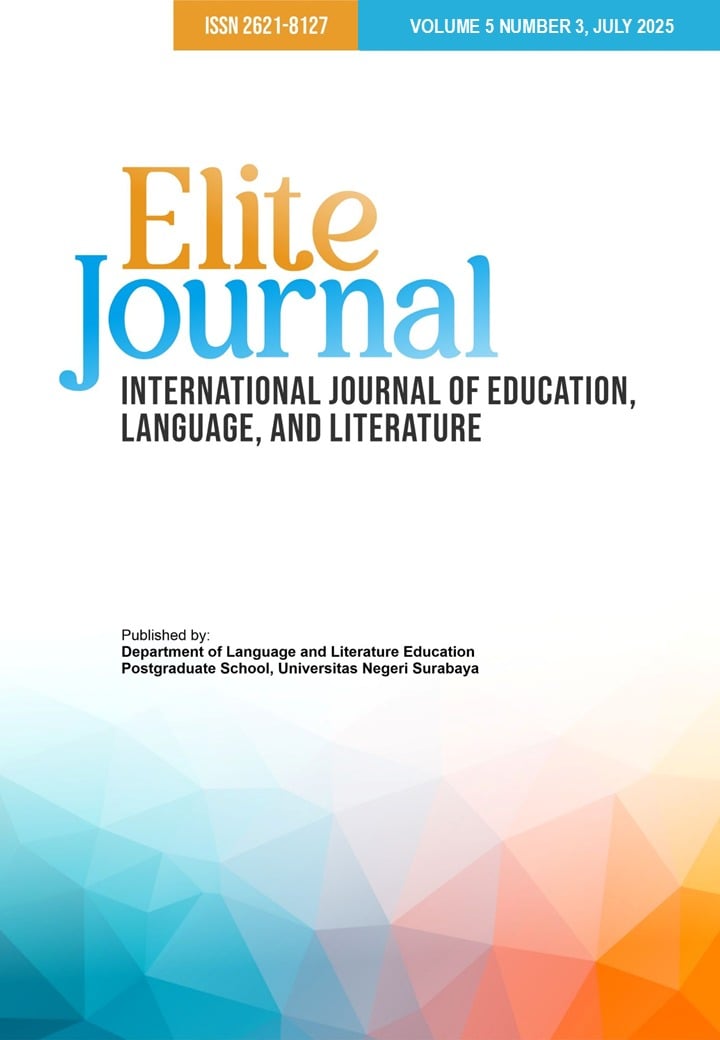THE DEVELOPMENT OF GUILDFORD DUDLEY’S SELF-CONCEPT AS AN ETHIAN IN MY LADY JANE (2024)
DOI:
https://doi.org/10.26740/elitejournal.v5n3.p1-14Keywords:
My Lady Jane, Romantic Sensibility, Self-Concept, State of Incongruence, Unconditional Positive RegardAbstract
Self-concept refers to an individual’s perceptions and beliefs about themselves. It has a significant influence on an individual’s personality and behavior, which in turn affects the way they form social relationships. In My Lady Jane (2024), the people are divided into two groups: regular human beings called Verities and a group of people who can transform into animals called Ethians. This study aims to explore the portrayal of Guildford Dudley’s self-concept development as an Ethian and how it affects his romantic relationship with a Verity named Jane Grey. By using a film analysis approach, this study utilizes subtitles as the main data and scenes screenshots as supporting data. This study employs Carl Rogers’ theory of self-concept (1959) to reveal how My Lady Jane (2024) portrays Guildford Dudley’s self-concept as a journey toward self-acceptance. This study also reveals how Guildford Dudley’s self-concept as an Ethian leads his relationship with Jane Grey through every stage and at the same time is affected by it.
References
Ab Razak, R. R. (2020). The Major Concepts of Humanistic Theories. Asian Journal of Research in Social Sciences and Humanities, 10(8), 1-32. https://doi.org/10.5958/2249-7315.2020.00012.x
Fletcher, J. (October 28, 2022). 11 Personality Masks We Wear. The PsychCentral. Retrieved on April 14, 2025, from https://psychcentral.com/health/the-masks-we-wear#masking-examples
Hanyu, F., & Min, W. (2023). A Study of the Influence of Female Self-concept on Elizabeth’s Garment Behavior in Pride and Prejudice. Journal of Literature and Art Studies, 13(12), 983–987. https://doi.org/10.17265/2159-5836/2023.12.009
Ismaill, N. A. H., & Tekke, M. (2015). Rediscovering Rogers’s Self Theory and Personality. Journal of Educational, Health and Community Psychology, 4(December), 143–150.
Mangtani, P. (2020). Understanding of Self. In Savita Mishra (Ed). Building Self Concept with the Learners (pp. 218-226). Delhi: ABS Books.
McLeod, S. (January 29, 2024). Carl Rogers Humanistic Theory and Contribution to Psychology. SimplyPsychology. Retrieved on January 9, 2025, from https://www.simplypsychology.org/carl-rogers.html
Permatasari, I., & Rosyidi, M. I. (2020). Self-Concept as a Result of Personality Disorder Portrayed in Haruki Murakami’s “Norwegian Wood.” Rainbow: Journal of Literature, Linguistics and Cultural Studies, 9(2), 166–175. https://doi.org/10.15294/rainbow.v9i2.37848
Proctor, C., Tweed, R. G., & Morris, D. B. (2020, March 23). Unconditional Positive Self-Regard: The Role of Perceived Parental Conditional Regard. The Humanistic Psychologist. Advance online publication. http://dx.doi.org/10.1037/hum0000168
Radha, D & Shiny S. (2020). Self and Self Concept. In Savita Mishra (Ed). Building Self Concept with the Learners (pp. 13-18). Delhi: ABS Books.
Rogers, C. (1959). A Theory of Therapy, Personality and Interpersonal Relationships as Developed in the Client-Centered Framework. In (ed.) S. Koch, Psychology: A Study of a Science. Vol. 3: Formulations of the Person and the social Context. McGraw Hill.
Rogers, C. (1974). A Theory of Therapy and Personality Change: As Developed in the Client-Centered Framework. Perspectives in Abnormal Behavior. 341-351. https://doi.org/10.1016/b978-0-08-017738-0.50039-9
Rogers, C. R. (1957). The Necessary and Sufficient Conditions of Therapeutic Personality Change. Journal of Counseling Psychology, 21(2), 157–166. https://doi.org/10.4324/9781315259178-20
Santosa, M. S. (2019). The Formation of Self Concept and Self Esteem of the Formation of Self Concept and Self Esteem of Bully Victims in Koe No Katachi Film [Bathelor's Thesis, Muhammadiyah University of Surakarta]. https://eprints.ums.ac.id/70052/2/PUBLICATION.pdf
Schat, S.-J. (2020). An Introduction to Self-Concept Theory: How Self-Perception Shapes Behavior. Journal of Invitational Theory and Practice, 29(2023), 23–46.
Wehrle, K., & Fasbender, U. (2019). Encyclopedia of Personality and Individual Differences. Encyclopedia of Personality and Individual Differences, December 2018. https://doi.org/10.1007/978-3-319-28099-8
Yazdani, S., & Ross, S. (2019). Carl Rogers’ Notion of “Self-Actualization” in Joyce’s A Portrait of the Artist as a Young Man. 3L: Language, Linguistics, Literature, 25(2), 61–73. https://doi.org/10.17576/3L-2019-2502-05
Downloads
Published
How to Cite
Issue
Section
License
Copyright (c) 2025 Mayang Dyah Artamia

This work is licensed under a Creative Commons Attribution 4.0 International License.
 Abstract views: 79
,
Abstract views: 79
, PDF Downloads: 101
PDF Downloads: 101





